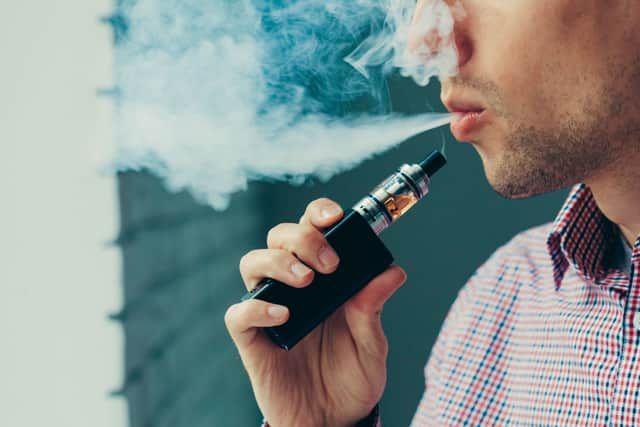Vaping damages lungs just like cigarettes and even low exposure to e-cigarettes has impacts, research finds
and live on Freeview channel 276
Vaping damages the lungs just like smoking conventional cigarettes, causing cellular and molecular changes that could lead to disease over time, scientists warn.
Damning new research, which involved experiments in mice, found vaping prolonged inhalation aerosols and affected the pulmonary immune system - altering gene and protein levels.
Advertisement
Hide AdAdvertisement
Hide AdAlarmingly, even low exposure to mango-flavoured brands from JUUL, which is popular with teenagers and young adults, had significant impacts.


Vaping has risen rapidly over the past decade and has reached record levels in the UK, with an estimated 4.3 million people now regularly using e-cigarettes.
The new research in The FASEB Journal comes after smokers are often told that battery-powered e-cigarettes are an effective way to help them quit the habit.
The has also been released in the wake of California based Juul Labs being ordered to pay a $440 million settlement for marketing its flavoured devices to teens. They are now banned in the US.
‘Widespread changes in the lungs’
Advertisement
Hide AdAdvertisement
Hide AdFlavourings in e-cigarettes have been shown to trigger inflammation, either similar or worse to what is seen in traditional cigarette use.
They simulate smoking the real thing by dispensing a vapour derived from liquid chemicals in a refillable cartridge that also contains propylene glycol and nicotine.
Propylene glycol is a colourless and odourless additive and is found in processed foods and drinks. It is also used as a solvent in a number of pharmaceuticals.
Corresponding author Dr Carolyn Baglole, of McGill University, Montreal, and colleagues identified an abundance of neutrophils in the lungs of the rodents.
Advertisement
Hide AdAdvertisement
Hide AdThey also found immune cells recruited upon infection or injury and a hallmark of acute inflammation. This was after three weeks of exposure - mimicking light or moderate amounts of e-cigarette use in humans.
Dr Baglole said: "These findings are in agreement with several other lab studies investigating the pulmonary outcomes of e-cigarette exposure, including the ability of inhaled aerosols to increase lung neutrophils. Moreover, as in this study using mango-flavoured JUUL products, the impact of different flavours is notable, particularly fruit and tobacco flavours.
“The health consequences of vaping are not known. Our results show inhalation of the vapour generated by a popular brand of e-cigarette causes widespread changes inside the lungs.
“The data further highlights these products are not inert and may lead to lung damage if used long term."
Advertisement
Hide AdAdvertisement
Hide AdDr Baglole added: "Many individuals have previous exposure to JUUL products and in other countries continue to use this brand of e-cigarettes. Thus, there is a need to assess the health impact using exposure parameters that replicate human use patterns.
"We show low level chronic exposure aerosols has local immunomodulatory effects, and drastically changes protein and RNA expression in important pulmonary sites."
Ribonucleic acid (RNA) is tiny bits of DNA that fuels the production of proteins.
There are plans for future research to involve exposures longer than four weeks to simulate more chronic use. This may shed further light on lung damage.
Dr Baglole said: "Nonetheless, these findings highlight that these products elicit significant pulmonary changes, supporting the need for further study into the effects of e-cigarette use."
Comment Guidelines
National World encourages reader discussion on our stories. User feedback, insights and back-and-forth exchanges add a rich layer of context to reporting. Please review our Community Guidelines before commenting.
